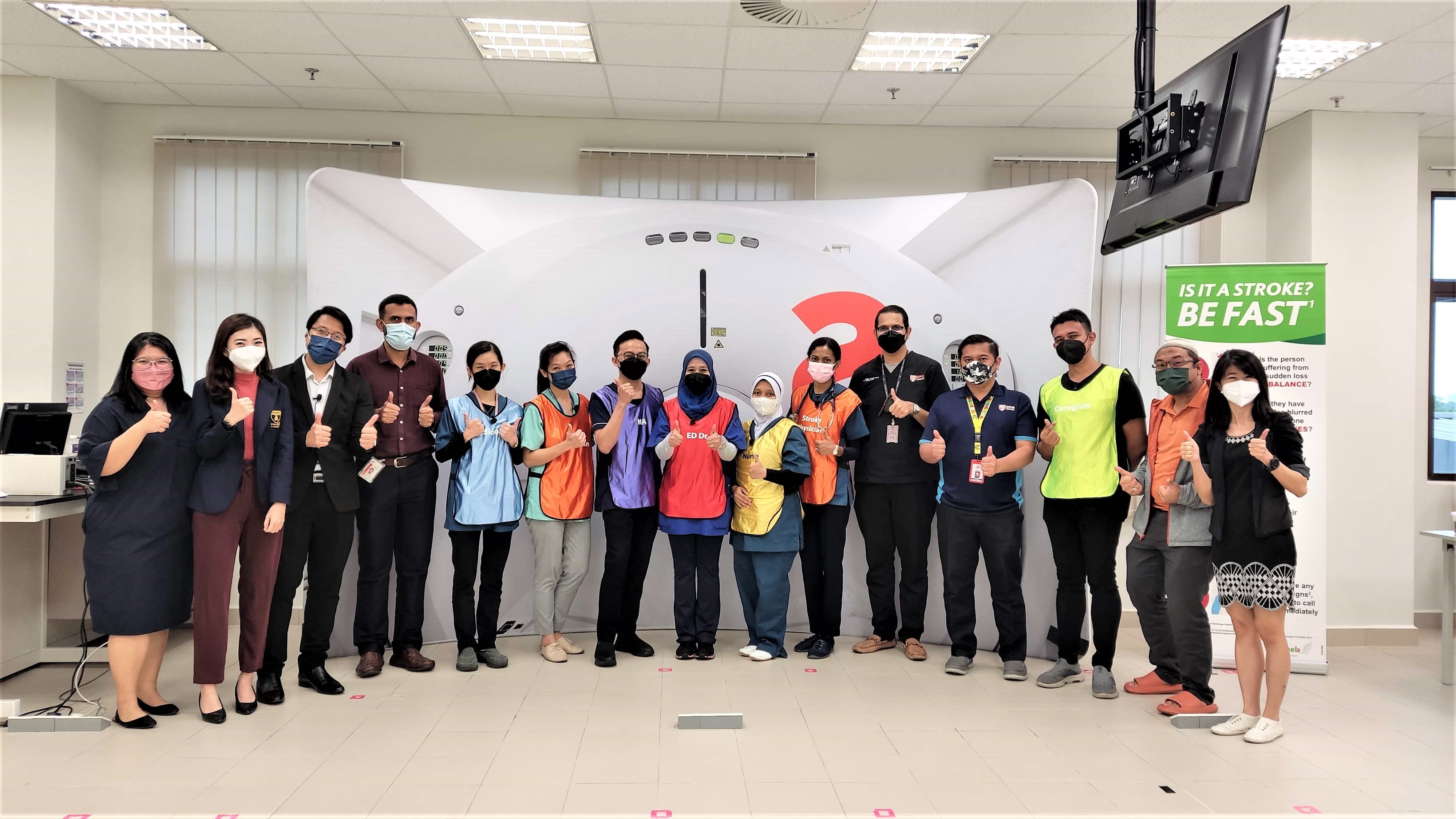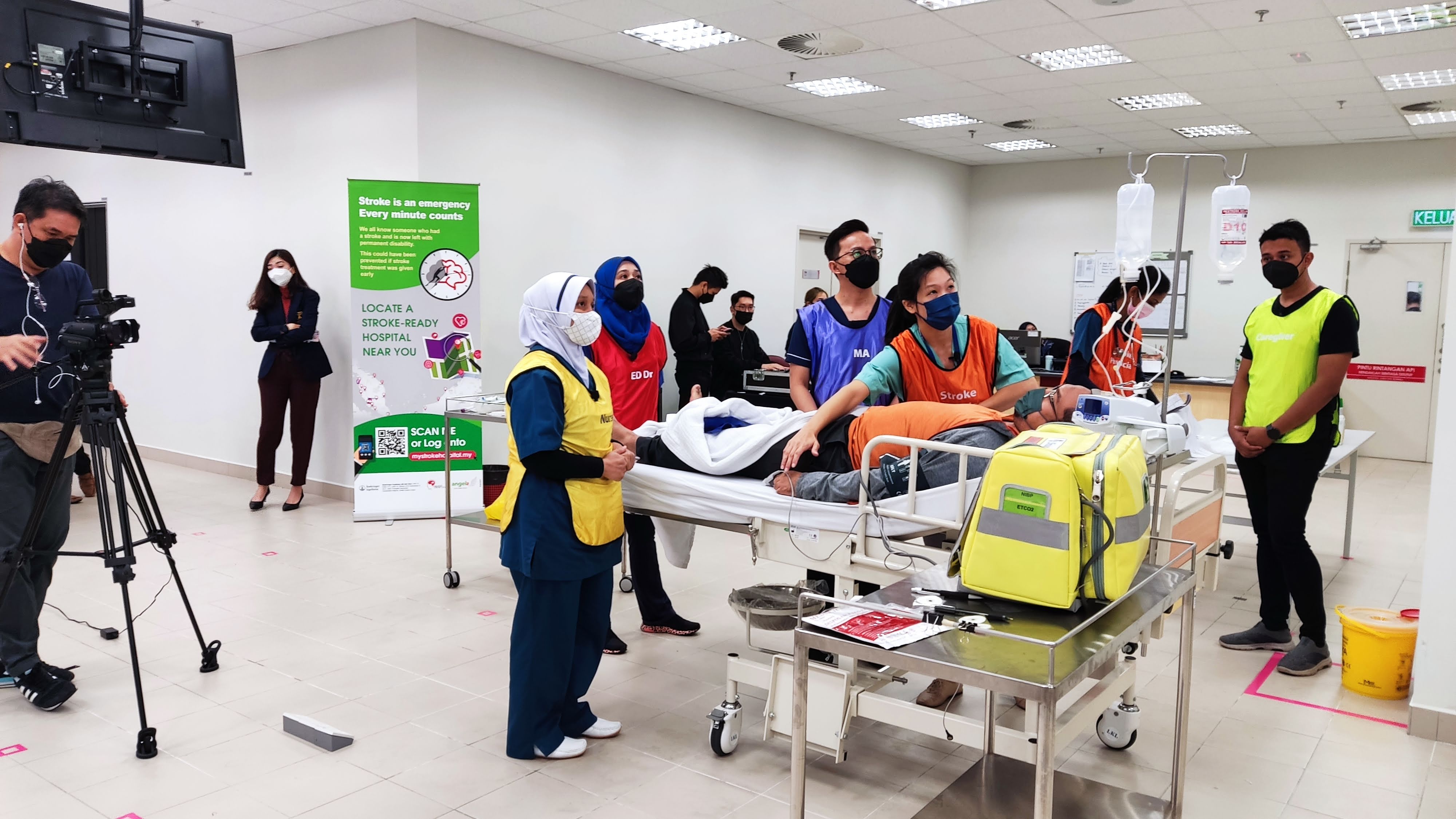
Los atletas rara vez establecen registros durante la formación. Esto se debe a que los seres humanos necesitan competir para probar los límites de nuestra capacidad. La competencia aumenta el esfuerzo, mejora el rendimiento y desencadena creatividad. Recuerda a los miembros del mismo equipo que todos trabajan para lograr el mismo objetivo y los motiva a tener éxito juntos.
Según el equipo de Angels de Malasia, esto es igual de cierto que los equipos de ictus que los equipos deportivos. En marzo de 2022, invitaron a tres hospitales a luchar contra él en un Desafío del equipo de simulación que, por primera vez, aprovecharía los beneficios de una competición amistosa en la lucha por mejorar la atención del ictus en Malasia.
Los objetivos, según la asesora de Angels y la directora del programa de cuidados del ictus del país, Elva Phan, eran identificar las lagunas en el circuito hospitalario y crear una situación en la que los equipos pudieran aprender unos de otros. Esperaron que la competencia llevaría a niveles de rendimiento más altos, fortalecería las relaciones dentro de los equipos e incentivaría el espíritu de equipo.
El Desafío inaugural del equipo de simulación fue un concurso tridireccional entre colegas que tuvo lugar en el centro de simulación del Hospital Pengajar UPM (HPUPM) en Serdang, a unos 30 minutos al sur de Kuala Lumpur. En la mezcla se encontraban los HPUPM, que en 2020 se convirtieron en el primer centro de ictus de gran volumen de Malasia con una unidad de urgencias especializadas en ictus, y en 2021 ganó su primer premio Angels Diamond de la WSO. En su contra, el Hospital Tuanka Ja’afar, dos veces ganador del premio Diamond, cuyo equipo de ictus estrechó un tiempo medio de puerta a aguja de primera categoría de 25 minutos en el lugar de la pandemia, y el Hospital Sultanah Zahirah, de la ciudad de la costa, Kuala Terengganu.

El concurso comenzó a las 8:30 de la mañana del viernes 4 de marzo, cuando el moderador, el Dr. Abdul Hanif Khan, y el juez jefe del 2022Spirit of excellence neurólogo del Hospital Canselor Tuanku Muhriz UKM, dieron instrucciones a los equipos. Todos tenían que tratar el mismo caso de sospecha de ictus que afectaba a un hombre de 41 años con desviación de la mirada hacia la derecha y una leve difamación observada en las dos horas anteriores. Su rendimiento sería registrado y evaluado por cuatro jueces, con los resultados anunciados y comentados en un taller multidisciplinar de Angels al día siguiente.
Los equipos podrían ganar un 25 % en cada uno de los siguientes elementos: circuito la puntuación de la NIHSS, la interpretación de la TAC, la toma de decisiones y el tiempo puerta-aguja, con una bonificación del 10 % por el trabajo en equipo y la excelencia general. Los criterios de evaluación reflejaron las principales acciones prioritarias para el tratamiento óptimo de las circuito del ictus. Por ejemplo, en la evaluación del tiempo puerta-aguja, los equipos podrían esperar perder puntos si optaran por esperar más imágenes después de que se descartara la hemorragia y la oclusión de grandes vasos, o si trasladaran al paciente al servicio de urgencias en lugar de iniciar el tratamiento en la TAC.
Para los equipos que compitieron, la tarde siguiente no pudo llegar lo suficientemente pronto. Fue entonces cuando tanto los participantes en persona como en línea del taller multidisciplinar tendrán la oportunidad de ver los vídeos de simulación y, tras los comentarios del Dr. Wan Asyraf Wan Zaidi, el Dr. Abdul Hanif Khan anunciaría los resultados.
Aplaudió el auditorio del HPUPM ya que el Hospital Tuanku Ja’afar fue nombrado ganador del primer Desafío del Equipo de Simulación de Malasia. También habían alcanzado el mejor tiempo desde la llegada hasta el tratamiento con 15 minutos y 56 segundos, abandonando el HPUPM con 17 minutos y 11 segundos, y el Hospital Sultanah Nur Zahirah sacó la parte trasera con unos impresionantes 21 minutos y 48 segundos.
Sin embargo, al final, ganar importaba menos que las lecciones que cada equipo había aprendido de sus rivales y que volvería a sus hospitales. Asimismo, los participantes del taller disfrutaban de un asiento en la fila delantera en una sesión de intercambio de mejores prácticas.
Elva informa de que en los seis meses posteriores al acontecimiento, la mediana de los tiempos puerta-aguja para los centros de ictus participantes había caído de 64 a 56 minutos, y que otros hospitales en racimos habían expresado su interés en replicar la competencia en sus propios centros.
El Consejo del Ictus de Malasia, cuyo catedrático adjunto presidente, Hoo Fan Kee, dio la apertura del taller, también ha reconocido la posibilidad de que un desafío a gran escala del equipo mejore el rendimiento del equipo de ictus.
Al elevar la calidad del tratamiento del ictus en todos los hospitales participantes, se trata de una competencia en la que no hay perdedores y donde los pacientes y sus seres queridos son los verdaderos ganadores.


